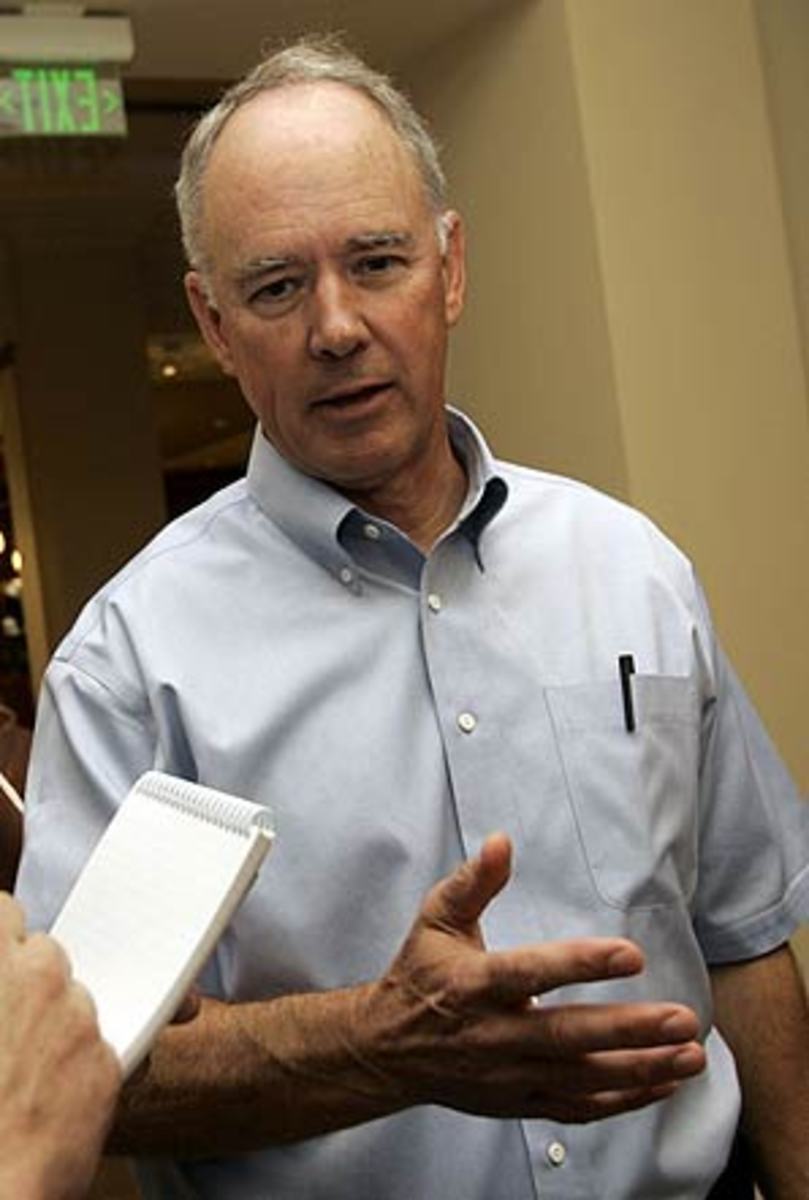
Alderson outlines plans for improving MLB's Dominican operation
The Dominican Republic's talent pool of baseball players is as deep as it is polluted. The heartwarming, rags-to-riches narratives of players like Pedro Martinez and Vladimir Guerrero who escaped poverty thanks to equal parts talent and dedication have been supplanted by accounts of age and identity fraud, a startling number of positive tests for performance-enhancing drugs and criminal investigations of team employees alleged to have skimmed money from Third World teenagers.
On March 8, baseball commissioner Bud Selig appointed longtime baseball executive Sandy Alderson to supervise the overhaul of MLB's initiatives in the Dominican. The 62-year-old Alderson is a former A's G.M. and Padres CEO who was also MLB's executive vice president of baseball operations from 1998 until 2005.
When he was introduced at the Hilton Santo Domingo on March 11, Alderson outlined his specific plans for reform, his thoughts on an international draft and those who train players for profit. Some of his answers are culled from a Thursday press conference and some questions have been translated from Spanish to English and, in some cases, condensed for clarity.
Question:What are your top three agenda items?
Answer: On a short-term basis, the problems [Selig] would like me to address are, No. 1, the use of performance-enhancing drugs. A disproportionate number of positive tests come from players in this country. That should not be acceptable. What we need to do is ensure that we are providing enough education in addition to just the deterrent to testing....The Dominican Republic gets in some ways, unjustified criticism because of the number and frequency of these positive tests. So that is one issue that needs to be addressed.
The second issue that is important on a short term basis is the age and identity issue. To the extent that this kind of problem continues to exist it will cause clubs to reconsider their investment in the Dominican Republic. Now, as I said earlier, it's a complicated problem and in part results from the complicity of some clubs and some of their personnel. It's been demonstrated that that personnel is both Dominican and American but if this problem persists, as I said, it will cause clubs to reconsider their investment in the Dominican Republic. The logical consequence of that is that the clubs will leave or reduce their presence. I don't believe that's in the interest of this country and it certainly it is not consistent with my commitment to preserve the overall positive environment that exists here.
The third element isn't really a problem, it's a goal for baseball to have a more positive reputation [in the Dominican] than it already does. That will result partially from addressing the two problems I've already described and also by being involved in projects that benefit this country and its people.
Q:Will MLB implement an international draft?
A: Number one, my immediate responsibility is to address the problems that exist on a short-term basis. At the same time, the existence of those problems might inevitably lead to a broader approach to the problem. It is easier for baseball to consider an international draft if the kinds of problems I just described continue to exist. As an aside, in the past, I've actually been a proponent of an international draft. So I think it's important for me to be forthright about that. But let me say: I don't believe the draft is inevitable because ultimately it's a matter of negotiation between major league baseball and the players association.
Q: Will MLB consider raising the age at which a Dominican player is eligible to sign with a team from 16 to 18?
A: It's very possible but it's also very possible that if 18 becomes the most desirable age, then the fraud will relate to 18 years of age and not 16 years of age. I will say longer term we need to look at the age of players in the Dominican Republic and whether 16 is an appropriate age for a player.
Q: What are your thoughts on buscones, (the middle men who train amateur prospects in exchange for a percentage of their signing bonuses)?
A: At risk of making the case for blasphemy, in some ways, which are often obscured by other negatives, in some ways, they're a positive force in developing players in the Dominican Republic. [That said] there are many negatives associated with some or all of them... I'm certainly not down here to try to eradicate that group. I'm here to try to figure out a way for baseball to function ethically and fairly for everyone involved in an environment where that's often difficult to do.
Q: Will MLB fingerprint prospects as a means of fraud prevention?
A: There is a misconception about the use of fingerprinting. First of all, it's not being utilized currently and whether it will ever be used is under review. If it is used, it will only be used on players as part of a registration process prior to entering a club academy so that they we can make sure those players aren't being taken advantage of by any particular club. . .There's absolutely no intention whatsoever to use fingerprinting for any other purpose including youth baseball.
Q: Your plans are specific to the Dominican Republic. Will the initiatives be applied in other countries like Venezuela which have experienced similar problems?
A: I would say to the extent that it exists in other places, the same approach to the problems will be taken. The reason there is a focus on the Dominican Republic is recognition not just of the problem but of the importance of the Dominican Republic and the disproportionate influence the Dominican Republic has on Major League Baseball. From the standpoint of the country that's a significant fact which the country I know is very proud of. Part of my responsibility is to preserve that and reinforce it.





